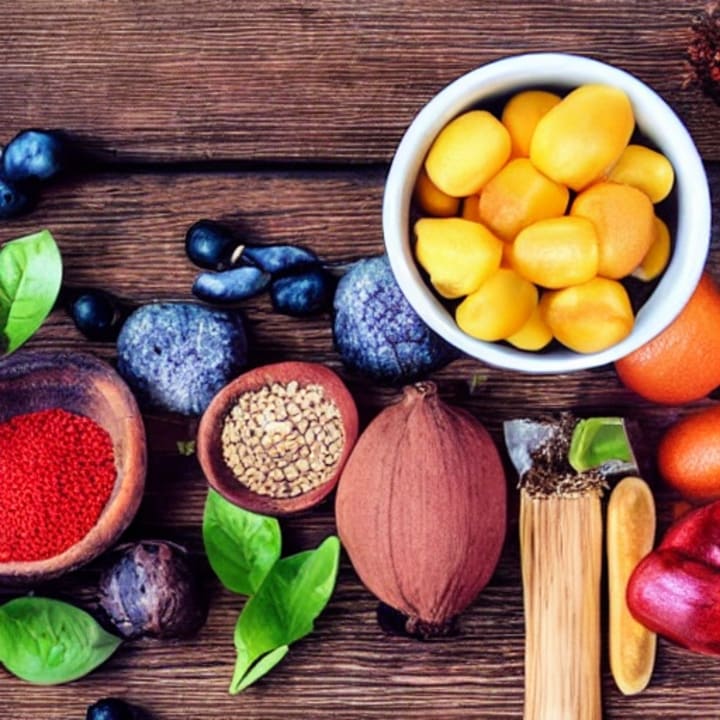You Can be the Next Hercules with Lost superfoods
Superfoods for Becoming Strong and Healthy as Ancient Giants.

As we look back on the tales of ancient Greece, one hero stands out above the rest - Hercules, a demigod known for his incredible strength and bravery. But where did this legendary hero get his strength from? It turns out, much of it may have come from the superfoods he ate.
In ancient times, giants like Hercules were said to consume massive quantities of food to fuel their strength and endurance. But not just any food - they sought out superfoods, nutrient-rich substances that were believed to have special powers.
These superfoods were abundant in ancient Greece and were thought to be essential for maintaining health and vitality.
One of the most well-known superfoods of ancient Greece was the fig. Figs were prized for their sweet taste and high nutrient content and were believed to have medicinal properties. They were often eaten fresh, but could also be dried and stored for later use.
Other popular superfoods included olives, grapes, and pomegranates, all of which were rich in antioxidants and other important nutrients.

But as time passed and civilizations changed, many of these ancient superfoods were lost to history. They were replaced by more readily available, but less nutrient-dense, foods, and their health-promoting properties were forgotten.
Today, however, interest in ancient superfoods is on the rise. People are rediscovering the benefits of these nutrient-rich substances and incorporating them into their diets once again. And this is why the "Lost Superfoods" book comes to you.
The "Lost Superfoods" book is a comprehensive guide to the ancient superfoods of Greece and beyond. It explores the history and uses of these forgotten foods and provides recipes and tips for incorporating them into your modern diet.

But the book isn't just about the superfoods themselves - it's also about the connection between these nutrient-rich substances and the legendary heroes who consumed them.
Hercules, it turns out, was just one of many ancient figures who relied on superfoods to fuel their strength and vitality. By rediscovering these lost superfoods, we can tap into the same strength and vitality that sustained our heroes of old.
So why not give the "Lost Superfoods" book a try? Whether you're looking to increase your energy, improve your health, or just add some delicious new recipes to your repertoire, this book has something for everyone. And who knows - you may just find that the power of ancient superfoods can help you feel like a hero yourself.
One of the most fascinating aspects of ancient superfoods is their versatility. Many of these foods can be used in a variety of dishes, from sweet to savory, and can be incorporated into meals at any time of day.
For example, figs can be eaten fresh as a snack or used to sweeten oatmeal or yogurt. Olives can be used to add flavor to salads and sandwiches or can be cured and served as a snack. Grapes can be eaten fresh or used to make wine or juice. The possibilities are endless!
Another reason to consider adding ancient superfoods to your diet is their potential health benefits. Many of these foods are rich in antioxidants, which can help protect against diseases like heart disease and cancer.
They are high-fiber, which can help your digestion and weight management. And because they are minimally processed, they tend to be more natural and less harmful to the environment than some modern, highly processed foods.

Of course, it's important to keep in mind that no single food can provide all the nutrients you need for optimal health. It's important to eat a varied diet that includes a variety of superfoods, as well as other healthy foods like fruits, vegetables, whole grains, and lean proteins. But adding ancient superfoods to your diet can certainly be a delicious and nutritious way to boost your overall health.
Finally, it's worth noting that the "Lost Superfoods" book is not just a collection of recipes and information about ancient superfoods. It's also a celebration of the rich history and culture of ancient Greece, and the role that these foods played in the lives of the people who lived there.
By exploring the stories and traditions surrounding these foods, we can gain a deeper understanding of the world of our ancestors and the ways in which they lived.
The Lost SuperFoods handbook is an incredibly valuable resource for anyone interested in survival, self-sufficiency, or simply expanding their culinary horizons. With 126 forgotten survival foods and preservation strategies, this book is jam-packed with information that is both fascinating and practical.
One of the standout features of this book is the abundance of recipes and details with pictures of valuable superfoods. These not only provide inspiration for meals but also give readers a clear understanding of what each food looks like and how it can be prepared.
In addition, the book includes nutritional facts for each food, making it easy to understand the specific health benefits of each ingredient.
But perhaps the most valuable aspect of this book is its focus on ideal superfood stockpiling for disasters and power outages. With chapters on the Leningrad World War II Siege Food, the Great Depression Food that Saved America, and a Civil War Food Miracle.

This book is an essential resource for the people like you and me who think to get prepared for any food crisis or shortage in a disaster or epidemic Situation if there will emerge in the future.
In addition to these historical examples, the Lost SuperFoods handbook also includes chapters on cheese preservation secrets, a long-lasting probiotic from Mongol times, the Ottoman Empire's shelf-stable meat, and Viking superfoods that were stockpiled on longboats to avoid spoilage.
There is even a unique British egg preservation method, Amish Poor Man's Steak, and a wind-swept recipe for outdoor preservation. And for the more adventurous readers, there is a chapter on the lost ninja superfoods.
Another convenient aspect of the Lost SuperFoods handbook is that it is available in both physical and eBook versions. This means that you can easily access the information wherever you are, whether you prefer to carry a physical copy with you or keep it stored digitally on your device.
So if you're interested in learning more about ancient superfoods, the "Lost Superfoods" book is a great resource to check out. It offers a wealth of information, recipes, and inspiration for incorporating these nutrient-rich foods into your diet and your life. So, give it a try and discover the power of ancient superfoods for yourself!
You can opt to purchase "The Lost Superfoods" book to learn more traditional methods of preserving superfoods without electricity or a refrigerator. It cost you only $37 in returns for great learning about ancient superfoods preservation methods to bring them again to the modern kitchen.
Overall, the Lost SuperFoods handbook is a must-have for anyone interested in survival, self-sufficiency, or simply trying new and unique foods. Its wealth of information, practical recipes, and convenience make it a valuable resource that belongs in any kitchen.
Check The Lost Superfoods Book with Digistore24
About the Creator
Shiran Kapila Jayawardhane
I am a blogger, writer, & freelancer, love writing, & preferred to write in education, science, tech: & health. And you can find me on Medium.com & quora.com.
I hope you may enjoy my articles
Best Regards,






Comments
There are no comments for this story
Be the first to respond and start the conversation.